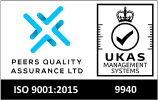The skills shortage is a fact of life across the engineering and manufacturing sector. Some sectors have been harder hit than others, with more traditional ‘blue collar’ roles particularly affected by dwindling apprenticeship and an ageing workforce. Advances in technology continue to drive innovation, so there is a need for highly skilled people to fill those roles.
And of course, we are still waiting to fully understand the impact that Brexit will have on the job market.
The stats themselves are pretty daunting with a report from Engineering UK (2017) showing that between now and 2024 the industry will need 265,000 skilled entrants every year.
There is clearly much that needs to be done to ensure the industry meets the challenges of the future. Our focus always has been, and will continue to be, on how we can help our clients attract high quality, motivated employees right now, despite the skills shortage.
Our approach to doing this has been broadly the same for over a decade in the industry. And we must be doing something right, as we’re placing more people now than ever before.
That’s probably because we have always believed that it is more important to find employees whose values and abilities match the needs of the organisation, than simply focusing on their skills and experience.
We’re confident that this approach works, so we always encourage a client to go with a candidate that has less experience than others on the list of prospects, because their values and abilities are the best match for that particular organisation.
This approach means that businesses need to make a commitment to training and development, but in a candidate driven market, that’s vital anyway. In recent research, 73% of people said that development and personal progression were among the top things they look for in a job.
We know that opportunity for progression is something that many businesses are concerned about, with the skills shortage putting employees in the driving seat in many respects. Many are worried that lack of opportunity for promotion means that the best talent will be tempted away by organisations able to offer a fast track to the top.
But that’s not necessarily the reality. Whilst not all businesses can offer progression in terms of promotion or large salary increases, many of our candidates are more interested in gaining new experiences and skills than progressing into a management role.
The businesses that we work with that are the most equipped at dealing with the challenges the skills shortage throws up, are the ones actively looking at how to best support employees in their professional development. Whether that’s encouraging more proactive peer learning or investing time, as well as money, in training and development.
They understand that progression doesn’t always have to be linear or upward, and they work with their employees to find out what type of progression they need to stay motivated.
We also encourage our candidates to think differently about the type of role they are looking for. It may mean looking at opportunities in different sectors or taking a new role that doesn’t necessarily offer a large pay increase. What it does offer though, is the opportunity for them to develop and achieve their ambitions. Our aim at all times is to place candidates in businesses where they will flourish over the long term.
Retention is a key issue for businesses at the best of times, but when the competition for the best talent is high, then it’s more important than ever. The companies with the best retention rates are the ones which take the time to meet the needs of employees not just when they first join the organisation, but throughout their career.
The skills shortage isn’t going to be solved easily, but by taking the right approach to recruitment and retention, we can certainly go a long way to limiting its impact.












